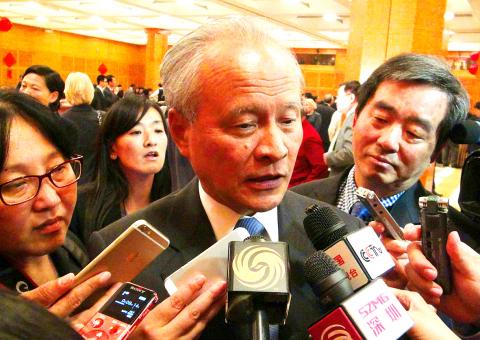The Democratic Progressive Party (DPP) yesterday condemned Chinese Ambassador to the US Cui Tiankai (崔天凱) for calling DPP Chairperson Tsai Ing-wen’s (蔡英文) visit to the US a “job interview,” adding that his call for Tsai to be interviewed by China was rude and would not help to improve cross-strait relations.
“Chairperson Tsai has made it very clear in her commentary piece in the Wall Street Journal yesterday that maintaining stable and sustainable developments in cross-strait relations are important objectives,” DPP Department of China Affairs director Chao Tien-lin (趙天麟) told a news conference at DPP headquarters in Taipei. “We hope to create transparent channels of communication between the DPP and Beijing, as well as between the party and the public to strengthen mutual trust and cooperation across the Taiwan Strait, and to maintain peace and stability through exchanges, cooperation and dialogue in accordance with our principles.”
Chao said DPP presidential candidate Tsai has stressed that the visit is not a “job interview,” but to deliver the message that Taiwan and the US both believe in the universal values of democracy, freedom and human rights.

Photo: CNA
“Cui has not only intentionally twisted [Tsai’s intentions], but he arrogantly considers China as some sort of ‘heavenly court,’ asking Tsai to be tested by all Chinese,” Chao said. “This rude language is shocking and it does not help to improve mutual understanding and communication across the Taiwan Strait.”
Chao urged direct dialogue, adding that Beijing should refrain from making deals behind closed doors, while refusing any goodwill from the DPP.
Noting that some people have said Tsai’s visit to the US is aimed at soliciting Washington’s support ahead of January’s presidential election, Cui had said he wondered why she would talk to foreigners, but not directly to her compatriots on the other side of the Taiwan Strait.
“She first has to pass the test of the 1.3 billion Chinese,” Cui said.
Tsai should also state clearly whether she accepts the “one China” principle and should leave no ambiguity about that point, he said.
Cui said that China has been vigilant against activities to push for Taiwanese independence and there is no room for ambiguity when it comes to the “one China” principle.
“We have made it clear to the US that China is opposed to any activities related to Taiwan independence staged in the US and oppose the US giving a stage to such activities,” he said.
Additional reporting by CNA

SECURITY: As China is ‘reshaping’ Hong Kong’s population, Taiwan must raise the eligibility threshold for applications from Hong Kongers, Chiu Chui-cheng said When Hong Kong and Macau citizens apply for residency in Taiwan, it would be under a new category that includes a “national security observation period,” Mainland Affairs Council (MAC) Minister Chiu Chui-cheng (邱垂正) said yesterday. President William Lai (賴清德) on March 13 announced 17 strategies to counter China’s aggression toward Taiwan, including incorporating national security considerations into the review process for residency applications from Hong Kong and Macau citizens. The situation in Hong Kong is constantly changing, Chiu said to media yesterday on the sidelines of the Taipei Technology Run hosted by the Taipei Neihu Technology Park Development Association. With

CARROT AND STICK: While unrelenting in its military threats, China attracted nearly 40,000 Taiwanese to over 400 business events last year Nearly 40,000 Taiwanese last year joined industry events in China, such as conferences and trade fairs, supported by the Chinese government, a study showed yesterday, as Beijing ramps up a charm offensive toward Taipei alongside military pressure. China has long taken a carrot-and-stick approach to Taiwan, threatening it with the prospect of military action while reaching out to those it believes are amenable to Beijing’s point of view. Taiwanese security officials are wary of what they see as Beijing’s influence campaigns to sway public opinion after Taipei and Beijing gradually resumed travel links halted by the COVID-19 pandemic, but the scale of

A US Marine Corps regiment equipped with Naval Strike Missiles (NSM) is set to participate in the upcoming Balikatan 25 exercise in the Luzon Strait, marking the system’s first-ever deployment in the Philippines. US and Philippine officials have separately confirmed that the Navy Marine Expeditionary Ship Interdiction System (NMESIS) — the mobile launch platform for the Naval Strike Missile — would take part in the joint exercise. The missiles are being deployed to “a strategic first island chain chokepoint” in the waters between Taiwan proper and the Philippines, US-based Naval News reported. “The Luzon Strait and Bashi Channel represent a critical access

Pope Francis is be laid to rest on Saturday after lying in state for three days in St Peter’s Basilica, where the faithful are expected to flock to pay their respects to history’s first Latin American pontiff. The cardinals met yesterday in the Vatican’s synod hall to chart the next steps before a conclave begins to choose Francis’ successor, as condolences poured in from around the world. According to current norms, the conclave must begin between May 5 and 10. The cardinals set the funeral for Saturday at 10am in St Peter’s Square, to be celebrated by the dean of the College